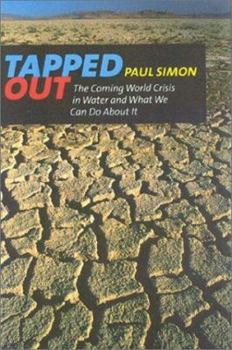Tapped Out: The Coming World Crisis in Water and What We Can Do about It
Select Format
Select Condition 
Book Overview
Senator Paul Simon is warning that clean water is in short supply and that we must do something about it. He proposed that every nation in the world on an ocean build many desalinization plants and... This description may be from another edition of this product.
Format:Paperback
Language:English
ISBN:1566492211
ISBN13:9781566492218
Release Date:December 2001
Publisher:Welcome Rain Publishers
Length:198 Pages
Weight:0.80 lbs.
Dimensions:0.5" x 6.0" x 9.1"
Customer Reviews
3 ratings
I Bought Several Copies
Published by Thriftbooks.com User , 16 years ago
I special-ordered "Tapped Out" in 1998 before it first arrived at local book stores. After reading it, I ordered additional copies for family members. The book's information is not new to many land owners who for several decades have been battling with governments over water rights, but the book's information is ideal for individuals who are new to the topic of water depletion. I sincerely wish that all city dwellers would read the book. The problem of diminishing water supplies is very real, and though most city residents may not be aware of the problem, many land owners and governments are deeply concerned. Perhaps the most beneficial aspect of the book is that it was written by a politician that was personally familiar with water laws. Though Simon is not a professional writer, I found the book to retain my interest and to be easily digested. I appreciated the frequent references to publications that Simon quoted from; a nonfiction book's value is graded most on its accuracy and references. Wars were sparked over water in the past, and water is among the top of the list of possible future wars. Today, in May of 2008, there is a global concern over fuel and food, which is as nothing compared to what happens when water is no longer available. "Tapped Out" speaks of the water shortages that currently exist in Mexico, India, Pakistan, Thailand, the Middle East, and throughout the world, including the USA and even the Philippines. It is very important that everyone learns why water shortages are occurring, and "Tapped Out" would be a good book to begin learning from.
A Powerful Call to Action
Published by Thriftbooks.com User , 23 years ago
Wnen it comes to water and environmental issues, the United States looks much more like a third world banana republic than a first-world, top-of-the-heap military and economic superpower. Years ago, former US senator Paul Simon alerted our government to a problem that could be mankind's undoing: the uneven distribution and wasteful consumption of water for agriculture, industry, and urban consumers across the nation and the greater world. His book, Tapped Out not only explains the problems associated with world supply, it also engages the average the person to contribute to the solution. Water is the only resource for which there is no substitute. The world's water resources are plagued with a great variety of problems, and they typically fall into one of five broad groups- availability, quantity, quality, distribution, and competing agendas. Rich countries are increasingly finding themselves pitted against poor countries for limited water resources. In many instances, large and wasteful consumers are taking needed, precious quantities from others to slake their insatiable demand. Furthermore, more societies are reaching farther and farther to acquire this precious and critical resource.Tapped Out has a number of favorable attributes. The book introduces the reader to the problem in an easy to understand manner. All technical terms are clearly defined as they are presented, and the book succeeds immensely in achieving its stated goal- eliciting the reader's interest in water issues. Moreover, Mr. Simon goes beyond lamenting the situation, and offers practical solutions to the problem. Finally, Mr. Simon shows the reader how the average person can be part of the solution to the problem. The reader is not left feeling overwhelmed and powerless in the face of the sheer magnitude of the problem. As such, the book is a good call to action overall.However, there are a few moderate demerits, primarily structural, to the text. First, Mr. Simon cites too many examples in the first half of the text. These examples, while informative, come one after another and at times made the reading rather plodding. Instead, each major point should have been isolated, described in general terms, and then two to three examples which elaborate on each point should have been cited. That way, the reader gets a true sense of the problem while at the same time learning and more importantly retaining the pertinent facts. Second, the book relies too much on text, making the book very monotonous at times. Pictures would have added considerable value to the text. In addition a global map that explicitly displayed the distribution of the world's water resources, as well as the areas where water shortages are a problem, would also have been helpful. Moreover, the inclusion of graphs depicting trends in population, water supply and water consumption would also have been useful. Finally, future editions of the text should include a more balanced discussion of
Finally,dams are being removed
Published by Thriftbooks.com User , 25 years ago
Some progress in saving water resources is being made by removing dams-up to & including Glen Canyon Dam. Follow Simon's requests--last 3 pages-take action,this forboding crisis will be exacerbated by Y2K....






